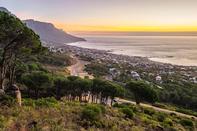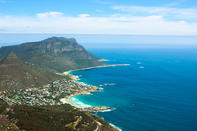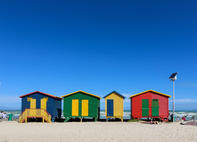Fertile Valleys
The Western Cape is a spectacular corner of Southern Africa where natural splendour seems to have been concentrated. Ranks of massive grey crags enclose white-fringed, cobalt-blue bays where, in spring, whales frolic in the shallows.

Great arches of chalice-shaped proteas, tiny bell-like Ericas and delicate orchids, gladioluses and a thousand other plants bloom abundantly on the mountain slopes.
Exuberant streams have carved secret, gorges deep into the jagged ranges, plunging through trout-filled pools, and bursting out into fertile valleys where orchards stand in ripe rows. Grapes do well in the dry, hot summers and cool, wet winters, and vineyards thread across the slopes.
Cape Peninsula
The Cape Peninsula, dominated by the formidable ramparts of Table Mountain, is the epicentre of the region and is its social focus. The oldest city on the subcontinent rests within the semi-circular embrace of two flanking mountains, Devil's Peak and Lion's Head: Cape Town, the Mother City, the Tavern of the Seas, a city situated at 'the fairest cape in all the circumference of the earth', as Sir Francis Drake declared it to be.
Cape Town retains its links with its colonial, past: 17th-century slave quarters and military barracks are renovate as sought-after city residences; 18th-century townhouses have become restaurants or stylish offices; baroque and neoclassical public buildings still stand next to modern high rises.
The city recedes southwards along the western Atlantic Seaboard, which weaves past cliffs and around coves that contain Mediterranean-style suburbs. Towards the storm-lashed headland of Cape Point, one passes long arcs of beach where surfers ride like torpedoes in the tubing breakers, and prolific birdlife decorates the estuarine wetlands, and fishing villages and hide-away retreats tucked into the hills.
Moving to the south-east along the Peninsula's mountain spine, suburbs almost as old as the city itself nestle beside parkland which in turn blends through pine woods to the delicious freshness of Newlands Forest, complete with moss and fern-frilled cascades and arcades of giant afro-montane trees, adjoining the visual extravaganza of the National Botanic Garden at Kirstenbosch.

False Bay
Beyond the historic vineyards on the slopes of the Constantiaberg is the magnificent sweep of False Bay, with its focus at festive Muizenberg. Brightly painted changing boxes at the famous beach at St James precede the colourful bustle of quaint fishing harbour at Kalk Bay.
City dazzle and seaboard odours, salt-encrusted old boats bobbing at their moorings, centuries-old homesteads and modern housing estates, rustic charm in the valleys and fynbos wilderness in the mountains, past and future, nature and technology seem to intersect at this far-flung corner of Africa.
For scenic diversity few places in the world can compare with the Cape Peninsula, with its contrasts of natural areas, the dramatic mountain and sea panoramas, the never-ending parade of vignettes of European and African culture, and noisy harbour scenes.

 The Cape Peninsula is shaped like a claw, curving out into the sea between Table Bay and False Bay. It is a magnificent headland, with extra...
The Cape Peninsula is shaped like a claw, curving out into the sea between Table Bay and False Bay. It is a magnificent headland, with extra... False Bay is so named because many sailors returning from the East used to mistake Cape Hangklip (near Hermanus) for Cape Point. As a result...
False Bay is so named because many sailors returning from the East used to mistake Cape Hangklip (near Hermanus) for Cape Point. As a result...